Table of Contents
As Singapore rapidly advances in the digital age, cybersecurity has become a top priority. With businesses and government agencies facing increasingly sophisticated cyber threats, the demand for skilled cybersecurity professionals has never been higher. Whether you're just starting your career or aiming to specialize, the Cybersecurity Certification Diagram in Singapore is your gateway to a successful and lucrative career in this dynamic field. This guide provides a comprehensive look at cybersecurity certifications in Singapore, covering costs, benefits, and career opportunities, with a special focus on how to succeed in 2025.
Why Pursue Cybersecurity Certification in Singapore?
Certifications in cybersecurity are not just credentials; they’re a proven pathway to career success in a highly competitive market. Here’s why pursuing a cybersecurity certification in Singapore is crucial, especially as we head into 2025.
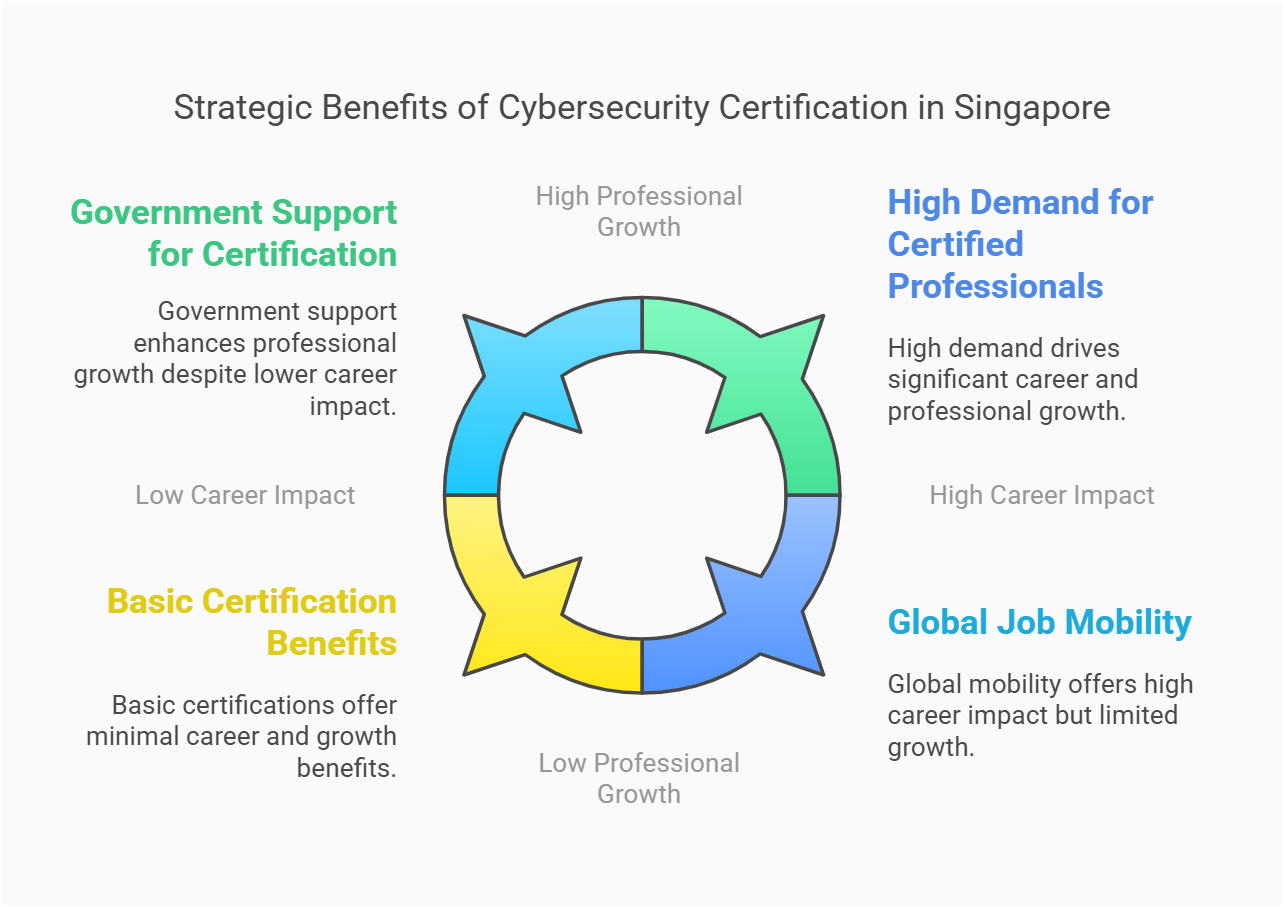
High Demand for Certified Professionals
Singapore is a tech hub, hosting numerous multinational corporations, government agencies, and financial institutions, all of which need robust cybersecurity defenses. With the increasing complexity of cyberattacks, the demand for certified professionals is growing exponentially.
The Cyber Security Agency of Singapore (CSA) has forecasted a 15% increase in demand for cybersecurity experts year-on-year. As a result, professionals who are certified in cybersecurity will be in high demand, especially those skilled in cloud security, AI-driven threat detection, and network management.
2025 Insight: The demand for professionals in areas like AI security, ethical hacking, and cloud security will be even greater in 2025, making certifications crucial for job readiness.
Higher Earning Potential
Certified cybersecurity professionals typically earn higher salaries compared to their uncertified peers. In Singapore, for instance, professionals with certifications like CISSP can earn upwards of SGD 120,000 annually. The value of cybersecurity professionals continues to rise as businesses and governments look for experts to secure sensitive data.
The increasing reliance on cloud services, AI, and machine learning will also escalate the demand for experts, pushing salaries even higher.
2025 Insight: Professionals who gain certifications in emerging fields, such as quantum-safe encryption and AI-based cybersecurity, will see significant salary increases.
Government Support for Certification
The Singapore government supports skills development through programs like SkillsFuture, which offers financial subsidies for various certification courses, including those in cybersecurity. This government initiative makes it easier and more affordable for professionals to gain certifications in a field that is vital to Singapore’s national security.
These initiatives ensure that professionals can stay competitive and keep up with industry demands without facing a significant financial burden.
2025 Insight: In 2025, Singapore will likely increase its efforts to fund cybersecurity training through government programs, recognizing the growing importance of cybersecurity professionals.
Global Job Mobility
Certifications like CISSP, CEH, and ACSMI Cybersecurity Certification have global recognition, which is a key factor for professionals looking for opportunities beyond Singapore. Whether you are interested in expanding your career regionally or internationally, Cybersecurity Certification Pay is an important consideration, as these certifications can enhance your job prospects and mobility across various sectors.
2025 Insight: As cybersecurity threats continue to evolve, professionals with certifications in advanced security solutions will find job opportunities not just in Singapore but globally, especially in tech-centric regions, where Cybersecurity Certification Pay continues to be competitive.
Top Cybersecurity Certifications in Singapore and Their Benefits
Choosing the right cybersecurity certification in Singapore depends on your career stage and the specific cybersecurity domain you want to specialize in. Below, we break down the best certifications available, from entry-level to advanced, to help guide your decision-making.
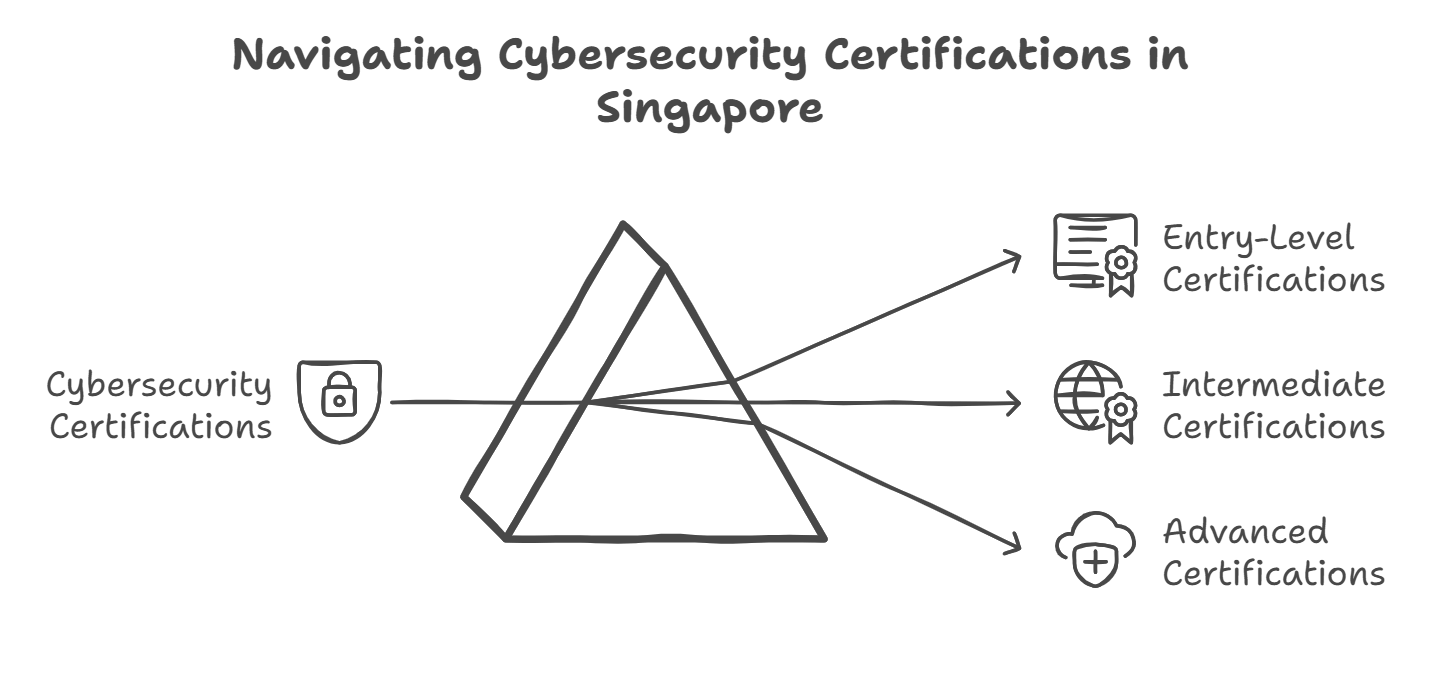
Entry-Level Certifications
For beginners or those switching to a career in cybersecurity, foundational certifications offer the necessary knowledge to get started. These certifications typically cover the basics of network security, risk management, and data protection.
CompTIA Security+
-
Focus: Provides a comprehensive introduction to network security, risk management, and basic cybersecurity concepts.
-
Cost: SGD 500–700
-
Why Choose It: Ideal for those new to cybersecurity, offering a broad overview of essential concepts. It’s also widely recognized globally.
ACSMI Cybersecurity Certification (Beginner Modules)
-
Focus: Over 400 modular courses on network security, risk management, and incident response.
-
Why Choose It: ACSMI’s flexible learning model, tailored for Singaporeans, ensures that beginners can learn at their own pace while gaining in-depth knowledge.
2025 Insight: As new cybersecurity threats emerge in 2025, entry-level professionals will benefit from gaining early exposure to cloud security concepts, a growing area in the industry.
Intermediate Certifications
For mid-career professionals looking to deepen their expertise, intermediate certifications offer more specialized knowledge and prepare individuals for roles such as penetration testers, security consultants, or network security engineers.
Certified Ethical Hacker (CEH)
-
Focus: Teaches ethical hacking techniques, focusing on how to legally identify and address system vulnerabilities.
-
Cost: SGD 1,600 (including training and exam fees)
-
Why Choose It: CEH is perfect for professionals who want to enter the ethical hacking field, which is growing rapidly due to increased security threats.
Certified Information Security Manager (CISM)
-
Focus: Focuses on security management, risk management, and governance—ideal for IT managers aiming to expand their security knowledge.
-
Cost: SGD 1,500–2,000
-
Why Choose It: CISM is perfect for those who wish to advance into leadership roles in cybersecurity, overseeing entire security frameworks and policies.
2025 Insight: As businesses increasingly move to cloud-based infrastructure, certifications like CEH and CISM that focus on cloud security will be more relevant in 2025.
Advanced Certifications
Advanced certifications are designed for experienced professionals who want to specialize in cybersecurity leadership or more technical, cutting-edge areas like AI, cloud security, and data protection.
CISSP – Certified Information Systems Security Professional
-
Focus: Focuses on advanced security concepts, including risk management, network architecture, and security engineering.
-
Cost: SGD 1,200 (exam only)
-
Why Choose It: CISSP is one of the most widely recognized and respected certifications in cybersecurity, offering opportunities for senior roles such as Chief Information Security Officer (CISO).
ACSMI Cybersecurity Certification (Advanced)
-
Focus: Includes specialized training in areas like artificial intelligence, cloud security, and data privacy.
-
Why Choose It: ACSMI’s advanced modules equip professionals with the tools to address the latest cybersecurity challenges, including securing AI and cloud systems.
2025 Insight: With AI-driven cybersecurity and quantum computing at the forefront of technological advancements, professionals pursuing these advanced certifications will be well-positioned for leadership roles in 2025.
The Cost of Cybersecurity Certification in Singapore
Understanding the cost of cybersecurity certification in Singapore is key when planning your career progression. Certification costs vary depending on the level of expertise required and the certification provider.
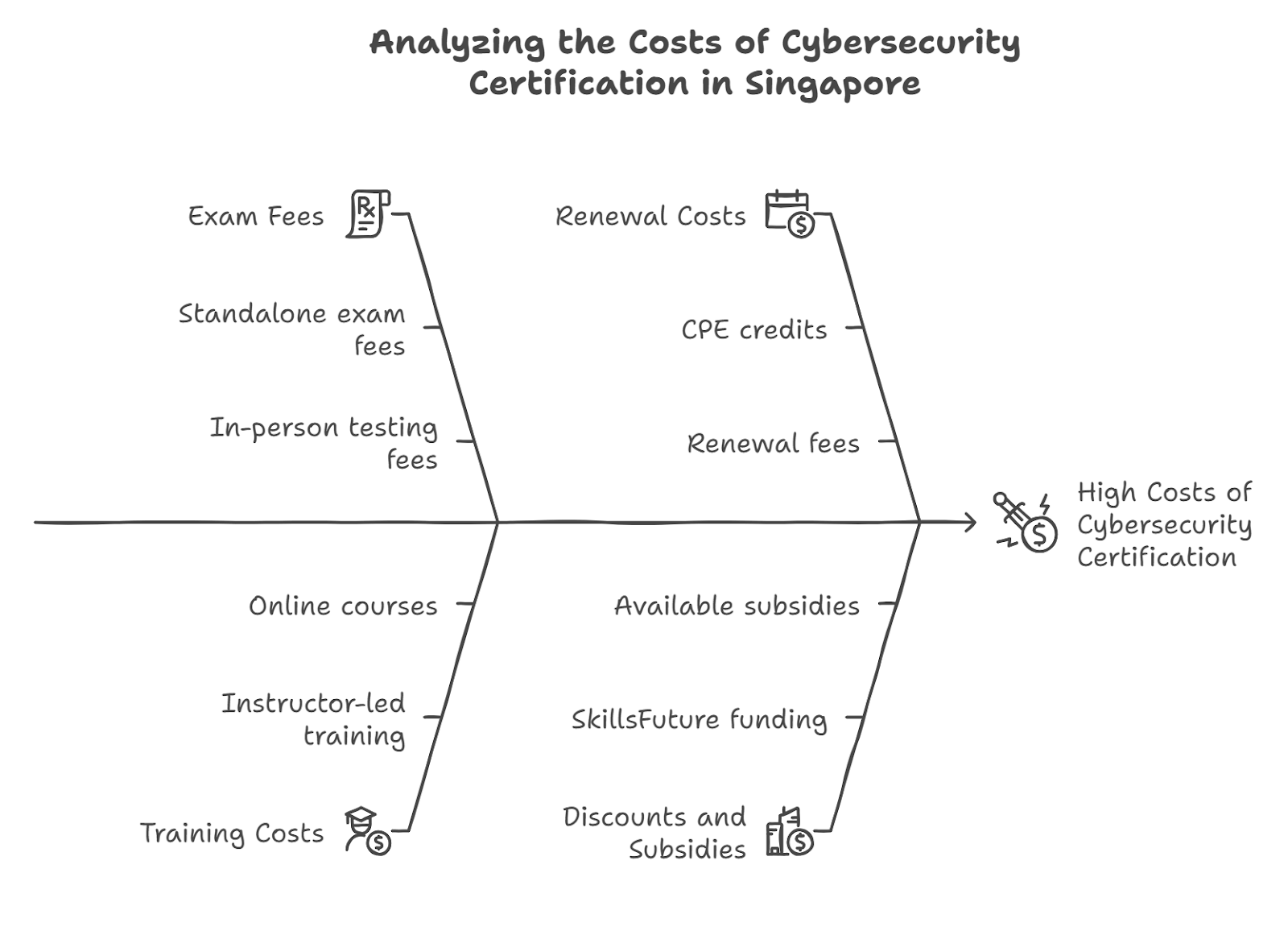
Exam Fees
-
Many certifications, such as CISSP, charge a standalone exam fee. For example, CISSP’s exam fee alone is SGD 1,200. Additional fees may be applicable if you choose in-person testing or retake exams.
Training Costs
-
Instructor-led training sessions can cost between SGD 1,000–2,000 on top of exam fees. However, online self-paced courses offer a more affordable alternative, with lower upfront costs.
Renewal Costs
-
Many certifications require renewal after a few years. For instance, CISSP requires professionals to earn 120 Continuing Professional Education (CPE) credits every three years, which comes with a renewal fee.
Discounts and Subsidies
-
Programs like SkillsFuture provide funding for certifications, making them more affordable for Singaporeans. Check for available subsidies before purchasing any certification.
2025 Insight: As cybersecurity continues to grow in importance, government programs like SkillsFuture are likely to expand, providing even more opportunities for financial support for certification.
Return on Investment (ROI) of Cybersecurity Certifications in Singapore
The ROI of cybersecurity certifications is significant, particularly when considering the potential for higher salaries, career flexibility, and industry growth.
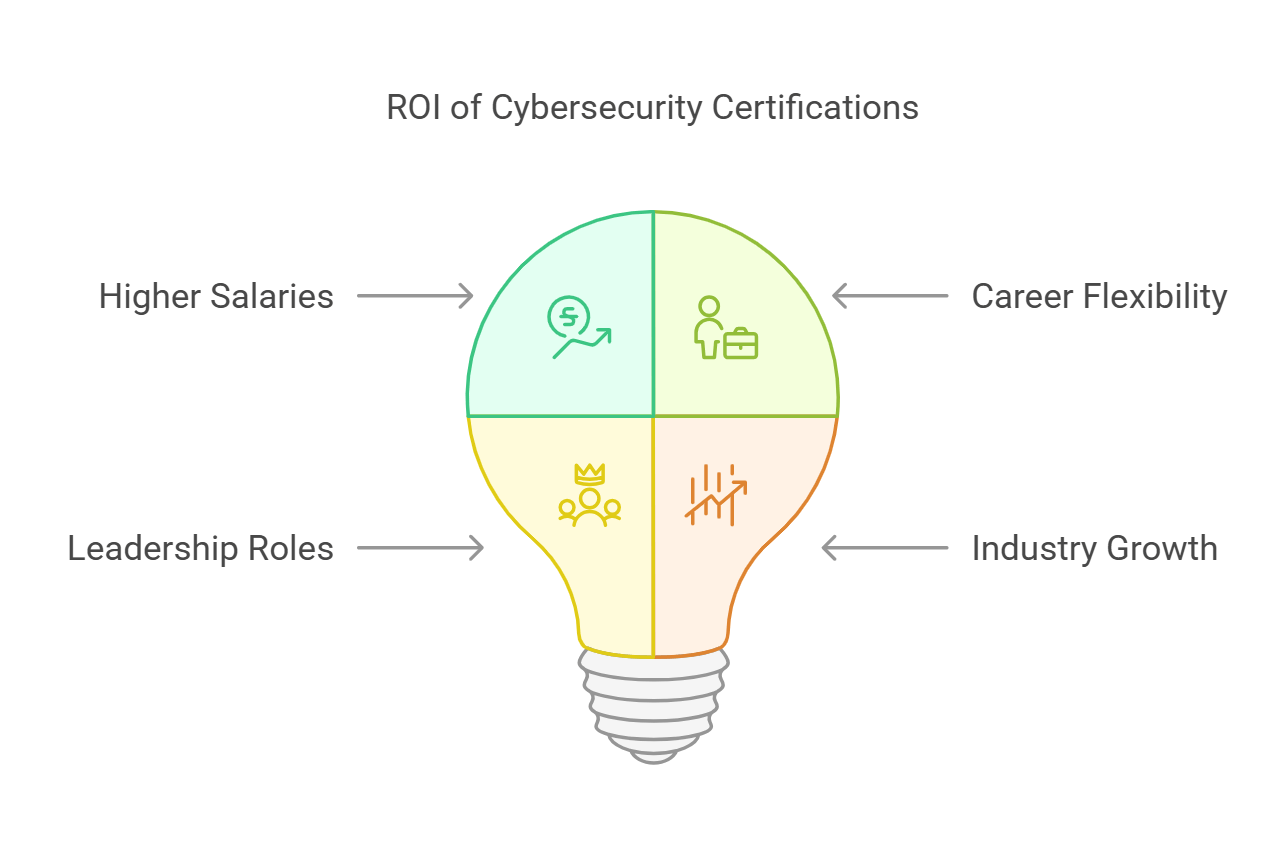
Higher Salaries
-
Cybersecurity certifications can increase your earning potential by 20-35%. Senior roles, such as IT Security Manager or CISO, offer lucrative salaries starting at SGD 150,000 annually.
Career Flexibility
-
Certifications like CEH, CISSP, and CISM allow professionals to work across a variety of industries. This flexibility increases your growth opportunities, whether in finance, healthcare, or government sectors.
Leadership Roles
-
Advanced certifications help professionals qualify for senior positions, often with more responsibilities and greater influence within an organization.
Industry Growth
-
The cybersecurity services market in Singapore is expected to grow at a rate of 10.4% annually through 2030, meaning certified professionals will continue to be in high demand.
2025 Insight: With rapid advancements in AI and cloud technologies, professionals certified in these areas will be able to leverage increased demand and enjoy career growth in 2025 and beyond.
How to Choose the Right Cybersecurity Certification
Choosing the right certification depends on several factors, including your career stage, budget, time commitment, and industry demands. Here’s how you can decide:
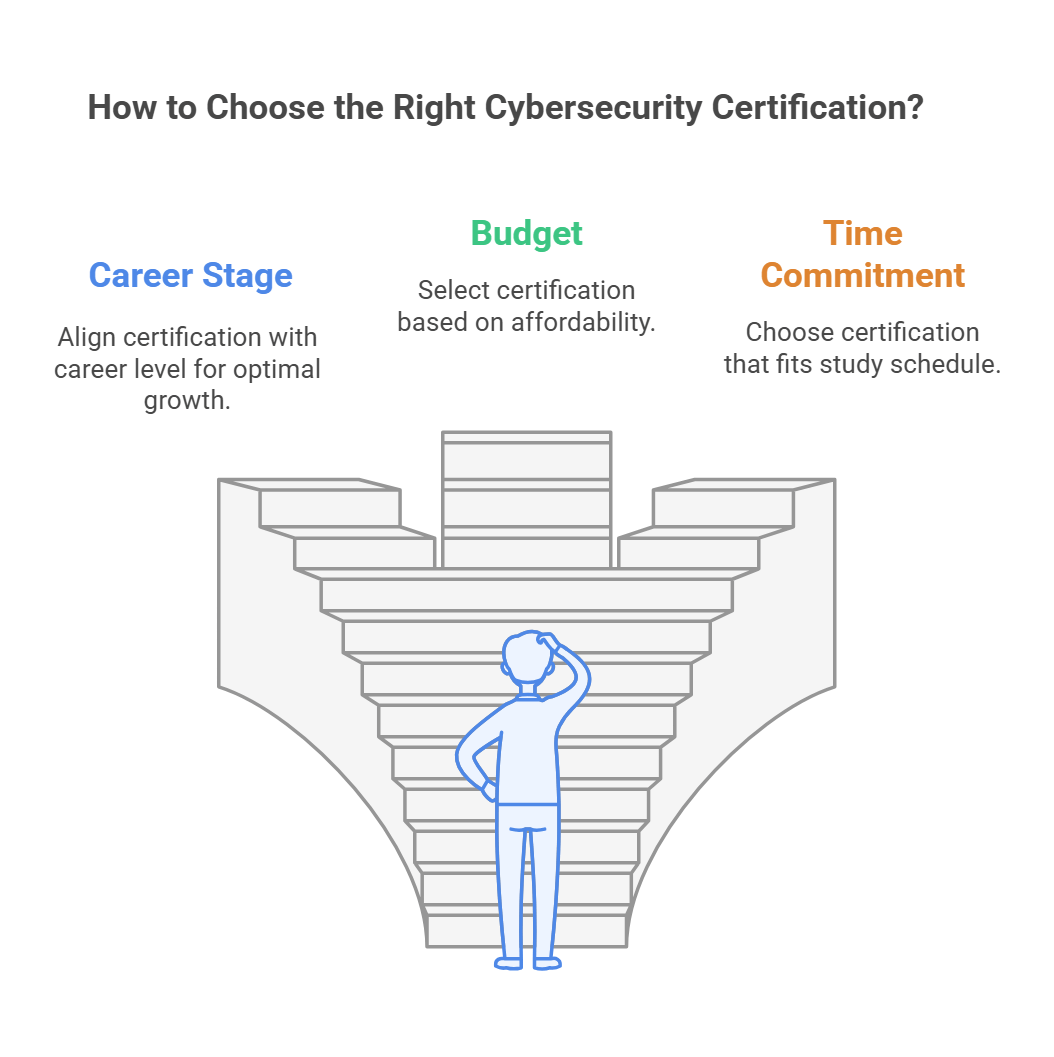
1. Your Career Stage
-
Beginners: Start with foundational certifications like Certification Path for Beginners, CompTIA Security+, or ACSMI’s beginner modules.
-
Mid-career professionals: Consider certifications like CEH or CISM to expand your expertise and open up specialized roles.
-
Advanced professionals: Pursue certifications like CISSP or specialized certifications in AI and cloud security for leadership roles.
2. Budget Considerations
-
Consider the total cost of obtaining the certification, including training, exams, and renewal fees. Self-paced, online courses tend to be more affordable than instructor-led ones.
3. Time Commitment
-
Some certifications require several months of preparation, while others can be completed in a few weeks. Consider how much time you can dedicate to your studies when selecting a certification.
4. Industry Demand
-
Research which certifications are most commonly requested by employers in Singapore. Certifications like CISSP, CEH, and ACSMI are frequently seen in job postings, indicating their relevance in the market.
Final Thoughts on Cybersecurity Certification Singapore
As the digital landscape in Singapore continues to evolve, pursuing a cybersecurity certification in Singapore in 2025 is a smart investment in your future. Whether you're a beginner or an experienced professional, certifications offer a clear path to career growth, higher salaries, and increased job opportunities.
Take advantage of government programs like SkillsFuture to lower the cost of certification and position yourself for success in the ever-growing cybersecurity industry. With the right certifications, you can navigate the challenges of cybersecurity and excel in this dynamic field.
FAQs on Cybersecurity Certification Singapore
1. How much does cybersecurity certification in Singapore cost?
Costs can range from SGD 500 to SGD 5,000, depending on the certification level and training fees.
2. What is the best cybersecurity certification for beginners in Singapore?
CompTIA Security+ and ACSMI’s foundational modules are excellent starting points for those new to cybersecurity.
3. Does the Singapore government offer financial support for certifications?
Yes, the SkillsFuture program provides funding to help subsidize certification costs for Singaporeans.
4. Are there job opportunities in Singapore after obtaining a cybersecurity certification?
Yes, there is a high demand for cybersecurity professionals in various sectors, including banking, government, and healthcare.
5. Can I complete certifications online in Singapore?
Yes, many cybersecurity certifications offer online and self-paced learning options, making them accessible for busy professionals.

Leave a Reply